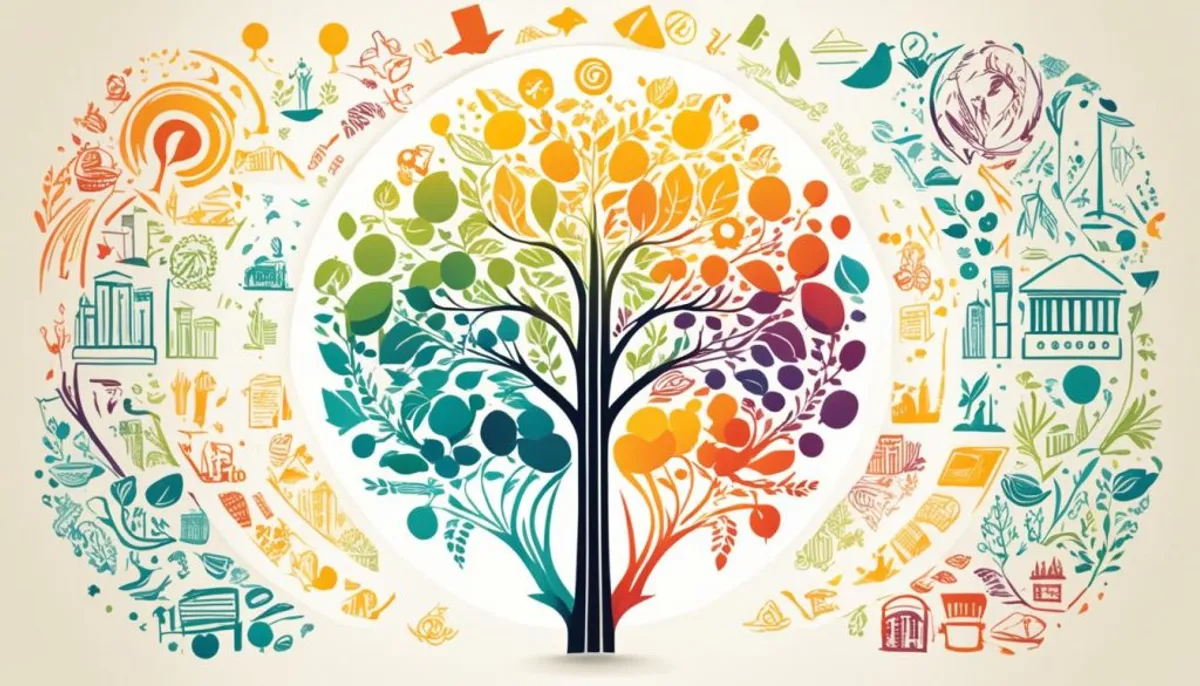Culture is essential for a living society. It is reflected in our stories, our celebrations, our memories, our entertainment, and our dreams. It helps us know ourselves and understand the world.
Culture is also beneficial for society and the economy. It enhances education, health, tolerance, and gatherings. This makes life better and happier for everyone.

Our cultural identity, our cultural heritage, and our cultural diversity are key. Culture changes our worldview and our relationships with others. It helps us understand our values and beliefs, highlighting the role of culture in our daily lives.
Intercultural dialogue makes people more understanding and fosters unity. Cultural industries and cultural policies strengthen our cultural soft power internationally.
Cultural Identity: An Essential Component of Our Society
Cultural identity is very important to us. It influences our worldview, our values, and our beliefs. It also helps us know who we are and feel connected to others.
Our sense of belonging comes from our cultural heritage. Our traditions, customs, and languages distinguish us and unite us. They reinforce the bond among group members and encourage intercultural dialogue.
Cultural diversity enriches our society. It opens our eyes, questions our beliefs, and teaches us about other cultures. By celebrating it, we build a more open and tolerant society.
In conclusion, our cultural identity makes us who we are. It unites us and distinguishes us. It is a foundation of our life and our society.
What is the Role of Culture in Education and Learning?
Culture and education are closely linked. Participating in cultural activities helps children and youth think and adapt. It also boosts their self-confidence. It improves their academic results.
Students from modest families who engage in art at school are three times more likely to graduate. This shows the importance of cultural skills for success.
Cultural Heritage Expands Lifelong Learning Opportunities
Cultural heritage is crucial outside of school. It opens new doors for learning. It also helps understand our cultural identity and our history.
| Benefits of Culture in Education | Concrete Examples |
|---|---|
| Better Academic Results | Students from modest families three times more likely to graduate |
| Development of Transferable Skills | Enhanced thinking, adaptability, and self-esteem |
| Broadened Learning Opportunities | Better understanding of history and cultural identity |

In summary, culture and education are key to growing and thriving. Investing in culture and cultural heritage helps achieve success in school and throughout life.
The Benefits of Culture on Health and Well-being
Culture and health are closely related. Many studies show that participating in culture is good for health. It also improves cultural well-being, making life better.
Cultural activities and health are becoming increasingly important in healthcare. This is true in the UK and Canada. They show that culture can help prevent and heal certain diseases.
The arts are very beneficial for the elderly. They combat isolation and help create an identity. They also improve understanding between cultures. This has a significant positive impact on this population.
| Benefits of Culture on Health | Evidence |
|---|---|
| Improvement of Mental Health | Reduction of depression and anxiety |
| Disease Prevention | Decreased risk of cardiovascular diseases |
| Better Quality of Life | Increased sense of well-being and satisfaction |
In summary, culture is crucial for health and well-being. The benefits highlight the importance of incorporating more cultural and health activities into our healthcare systems and policies.

Culture as a Vector of Social Cohesion and Community Development
Culture is crucial for social cohesion and community development. It brings people together, creating a strong bond among communities.
Culture Fosters Solidarity and Social Integration
Festivals, fairs, and gatherings are perfect for creating connections. They unite people through shared traditions and values. Thus, culture fosters solidarity and social integration.
It also helps strengthen trust and civic pride. And it encourages tolerance.
Cultural Heritage Strengthens the Sense of Belonging
Cultural heritage, whether material or immaterial, is vital for local development. It supports tourism and the preservation of traditions. This strengthens the sense of belonging in rural areas.
Enhancing cultural and community heritage improves social cohesion. And it promotes sustainable development.
| Areas | Impact of Culture |
|---|---|
| Social Cohesion | Promotes solidarity and social integration |
| Community Development | Strengthens the sense of belonging through cultural heritage |
| Local Development | Supports tourism and the preservation of traditions |
Conclusion: The Economic Importance of Culture
Culture is crucial for the economy of France. It creates direct and indirect jobs. In 2010, it contributed 22 billion euros to GDP, accounting for 3.7% of the economy.
The cultural sector provided 280,000 jobs in 2010, representing 4.1% of employment in France.
Interactive digital multimedia products (IDMP) are essential for growth and employment in culture. They offer new opportunities for cultural industries and cultural employment in France.
Culture is much more than mere entertainment. It is a pillar of the French economy. It creates jobs and enriches the country, underscoring its importance for the economic future of France.
RelatedRelated articles


